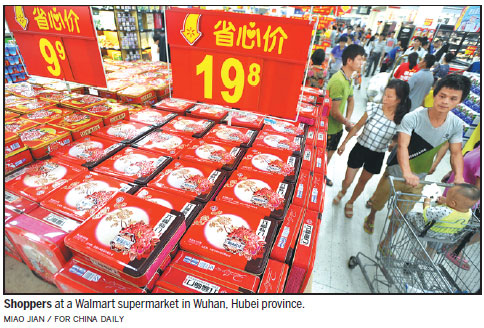Efficiency quest shrinks Walmart store size
By Wang Zhuoqiong (China Daily) Updated: 2017-08-08 08:24Walmart China is getting smaller in terms of store size to improve its efficiency and enhance convenience for shoppers.
The world-leading retailer opened its first "compact hypermarket" in Wuhan, capital of Hubei province in Central China, on Thursday.
The store is 40 percent smaller than a normal Walmart hypermarket that spans 10,000 square meters and sells 22,000 to 25,000 products.
The new store, with a floor space of about 5,000 square meters, offers 15,000 products. There are fewer large-sized home appliances such as televisions, refrigerators and air conditioners. But smaller home appliances such as hair dryers continue to be sold as usual.
Xiong Lu, general manger of Hubei region operations of Walmart China, said cost-cuts are not the reason behind smaller stores. "The small format will improve convenience in shopping."
Two checkout isles reserved for consumers who buy up to five items have greatly reduced waiting time. A self-checkout is planned by the year-end, he said.
The Wuhan store targets younger consumers aged between 20 and 30. Food products take up at least half of the shelf space.
More compact Walmart stores in first-tier cities such as Shanghai, provincial capitals like Kunming and emerging cities such as Huizhou in Guangdong province in South China are in the pipeline.
These will be among the 30 to 40 stores that Walmart plans to open in China this year.
The "smaller is better" concept is also being applied to Walmart's high-end membership stores.
Walmart announced on July 26 that Sam's Club will also expand in China with smaller and more nimble stores.
The Club is expected to reach 40 outlets by the end of 2020 and is investing 100 million yuan ($14.7 million) on high-value merchandize with better prices.
At present, Sam's Club has 16 stores in 13 cities in China, which are visited by nearly 1.8 million members.
Sam's Club will also reduce the areas "behind the stores" by setting up efficient logistics and supply chains in the upcoming three or four stores.
But this strategy will not be adopted at most of the newly opened outlets in China. Fresh food shelves will get larger size and less-frequented merchandizes will be given less shelf space.
"The compact store will make us more efficient. We can save more on costs. Eventually, the savings will be invested in membership values," said Andrew Miles, president of Sam's Club China. "Doing business in China means we have to pay more attention to cost structures in order to stand out."
Jason Yu, general manager of Kantar Wordpanel China, said: "Smaller hypermarkets force retailers to focus on essential categories and merchandise to satisfy core needs of shoppers who are now gradually moving their weekly grocery shopping online."
He questioned whether the new methods would actually bring young consumers back. But it can definitely improve operational efficiency and cut down space devoted to nonessential categories, so it will likely drive profit.
wangzhuoqiong@chinadaily.com.cn

- 'Cooperation is complementary'
- Worldwide manhunt nets 50th fugitive
- China-Japan meet seeks cooperation
- Agency ensuring natural gas supply
- Global manhunt sees China catch its 50th fugitive
- Call for 'Red Boat Spirit' a noble goal, official says
- China 'open to world' of foreign talent
- Free trade studies agreed on as Li meets with Canadian PM Trudeau
- Emojis on austerity rules from top anti-graft authority go viral
- Xi: All aboard internet express











